National Celebration Tinged with Mystery……………….
01 August is the anniversary of the date that the Federal Charter in Switzerland was signed, in 1291. Happy Birthday Confoederatio Helvetica (the country's official Latin name), hence the abbreviation CH.
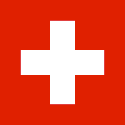
It is not my intention to explore the entire history of Switzerland but am curious as to why 1 August is the Bundesfeiertag (Federal Holiday i.e. Public Holiday) and how well known this public holiday is on the global stage. The U.S.A. celebrates Independence Day i.e. 4 July and there are many Xpats that celebrate this occasion with barbecues, fireworks etc.. Unfortunately, 4 July 2006 was a day when North Korea made a decision to test fire a long- range missile and five shorter -range rockets that caused increased diplomatic tension and a great deal of concern. The Republic of Ireland has St. Patrick's Day on 17 March, which does have global appeal. When working in the City of London, I recall Pubs opening in the morning to mark this celebration. There are St. Patrick Day parades held throughout the U.S.A., in Sydney (Australia), Tokyo, and Germany (a few examples). I am not sure why St. Patrick is popular but have a feeling it may be something to do with the Guinness (commonly known as the black stuff).
France has Bastille Day, which is celebrated on 14 July. I think it is a fair comment that the French National anthem is better known globally opposed to Bastille Day. Obviously not to french nationals and no offence is meant.
One of the most famous mystical (was this a true story?) tales in the history of Switzerland was that of William (Wilhelm) Tell who rebelled against the Habsburg rulers. He received punishment for his insubordination by being forced to shoot an apple off his son's head. Being an expert marksman he succeeded and finally ended up killing Hermann Gessler, the Austrian local governor (bailiff/reeve). Gioacchino Rossini used Friedrich von Schiller's play as the basis for his 1829 opera. The William Tell overture is one of his best-known pieces of music and it is globally known but I am not sure many would know the story or the significance of the tale behind this piece of music. The monument of Wilhelm (William) Tell is in Altdorf in the canton of Uri.
The Rütli meadow, on the shore of Lake Uri, is where the Oath of Eternal Allegiance (Alliance) was signed by the three cantons of Uri, Schwyz and Unterwalden (now divided into Nidwalden and Obwalden). Sadly the Rütli meadow has in recent years been linked to neo-Nazi thugs that have overshadowed public celebrations. In 2005, it was reported that the then Swiss President was shouted down by racist comments from people who were waving the Swiss national flag. This is not a side of the national holiday that Switzerland would want promoted globally but we are naïve if we think by ignoring these events they will just fade away. The underlying problem needs to be addressed and dealt with. The Coopzeitung (newspaper) shows a cartoon with the comment (rough translation): “So that the Rütli does not become the playing field of the Neonazis, security inspections/checks are needed.” The cartoon shows an intimidating security guard in dark glasses with the word `SECURITELL' on his shirt. He is also wearing a badge with a crossbow on it.
Switzerland is a small federative state situated in the middle of Europe, made up of a confederation of 26 cantons. Each canton has it's own flag. Switzerland constituted itself into a state in 1848. Switzerland has a population of approximately 7.3 million.
The Swiss national anthem (Schweizer Landeshymne) can be seen on the following website link: -
www.admin.ch/ch/e/schweiz/psalm/index.html
I struggle to understand my own nation's political system but do admit, as an Xpat, to being lost in the Swiss political maze; almost nearly as confused as to which language to use or which language to learn. The President of the Swiss confederation for 2006 is Moritz Leunberger (Bundespräsident). The Vizepräsidentin is Micheline Calmy-Rey. The President of the Swiss Confederation is elected for one year. If I have understood this correctly, Moritz Leunberger has been President previously so this is his second term.
The 26 cantons have their own type of parliament that governs the rules and regulations for each particular canton. Then there is the Federal Assembly and the Federal Council. I will not attempt to describe these political institutions in more detail, as I will most likely start a diplomatic incident based on my misinterpretation.
Swiss nationals have voting rights in Federal matters at the age of 18. Women obtained voting rights only as recently as 1971.
The Federal office for migration is in Bern(e), which is the capital of Switzerland and not Zürich - a common mistake. Integration is an important strategy for this political office and hopefully the drive forward may help relieve some racial tensions.
Details can be seen on: -
As an Xpat the next most confusing challenge, apart from understanding the drink `rivella' (only joking) is the different languages and which one to use at a particular moment.
There are 4 (or is that 5) official languages in Switzerland: -
German, French, Italian, Romansch (aka:Romansh, Rumantsch or Romanche) and maybe English depending who you speak to.
When the good news was delivered that I was accepted for an employment contract in Zürich for 2001, I naively started to review and revise the notes from my German lessons that I took in 1996. During my long commutes to/from the office (spending up to 2 hours commuting to/from work is not the normal culture in Zürich) in London, I would try to concentrate on learning more vocabulary and how to say, “Ich spreche ein bisschen Deutsch.” Only to find that when I arrived in the Zürich office I did not understand a word my colleagues were saying. But why could I not understand their German? Did I have out dated language books? Why did some retail assistants say Merci for Thank You? I was a confused Xpat. Then the existence of Schwyzertütsch or Suisse Allemand started to dawn on me. Allegedly, Swiss nationals take exams and school lessons in High German but again this depends on whom you talk to as I have heard conflicting stories. My status as a confused Xpat was escalated to a baffled Xpat when trying to communicate with a retail assistant on the telephone using my limited German, in my London accent. I was told that he could only speak Schwyzertütsch and needless to say the conversation did not last long. It is reported that there are a significant number of foreigners in Switzerland who can speak Swiss German reasonably fluently, but are unable to speak, read, or write High German effectively. This maybe an issue for the Federal office for migration as it may hinder an integrated society. If I have understood this correctly, Swiss German is a dialect i.e. it is not one of the official languages of Switzerland. This would be similar to people in Scotland, U.K. speaking the local dialect but being unable to communicate effectively in English.
One Xpat work colleague (in 2001) had learnt, much to her delight, that if she asked for a Gipfeli she would obtain a croissant in the staff restaurant. The same person was confused when trying to read a German newspaper referring to ein Gipfel when reporting on a summit meeting. Xpats need to be careful with their choice of words
It is reported that approx 63% of the Swiss population speak German.
So how will people be celebrating `Der Nationalfeiertag'?
Oder:-
Französisch - Fête Nationale
Italienisch - Festa Nazionale
Rumantsch - Fiasta Naziunala
A poll in the Coopzeitung shows that 33% will be staying at home, 10% will attend officially organised events, 18% do not know what they will be doing, and 36% will be celebrating in other ways (exact details not specified).
The Coop supermarket sold special celebratory bread - Bio 1.August-Weggen amongst other products. 50 rappen from the sale of the bread goes to a special project set up for the mountain areas - if I have understood this correctly.
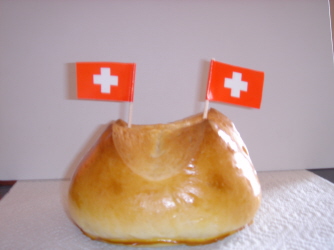
In the years that I have been in Switzerland, I have seen some fantastic firework displays but have read that this year due to the extreme dry conditions and the recent heat wave some firework displays will not take place. Also caution was called for all those planning to have barbecues in open fields. Some of the areas are like tinder boxes waiting to go off. Even in built up areas the grass is burnt yellow, some green shrubs have faded, and leaves are tinged with a burnt brown edge.
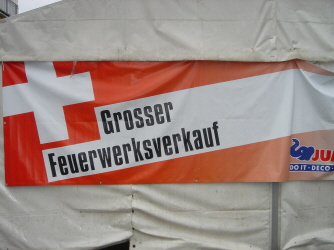
Through the cloudy skies and much needed rainfall the sound of church bells ringing filled the welcomed cooler air at approx 20:00 on 01 August 2006. During the day I did not hear any sound of celebrations taking place but later in the evening did hear the sound of what appeared to be a subdued firework display.
Thankfully, the investment in tight security paid off and the extremist groups were unable to spoil the celebrations. Moritz Leuenberger said that the Swiss can not live in isolation. He went on to say, “Identity is not defined by differences amongst people, but through solidarity, cooperation and mutual respect within communities.” An estimated 200,000 people attended brunches traditionally offered by farmers across the country on 1 August.
Many countries suffer from unfair stereotypical descriptions and I am afraid Switzerland are not excluded. The Swiss are described as: -
Efficient, rigid, insular, punctual, secretive, clean, cold, reserved, critical, insecure etc…
Some of these words are unfair and not accurate. No one can tar any one nationality with the same brush. It is similar to the stereotype that all the Irish are educationally challenged. The boss of Ryanair - Michael O'Leary might have a few words to say about that subject. Prejudice is based on ignorance and fear. Once you get past the labels, take off the blinkers, and make an effort to get to know the people it is usually different.
Switzerland is well known for low income tax but some ask is there a tax on humour? Some Xpats may find this cultural difference quite tricky to deal with. In my experience I have found Swiss nationals generally (not everyone) to take remarks literally even when I was making an attempt at being ironic. Obviously, one has to take into account the language barrier may not help in these examples. I sometimes wonder what a Swiss audience would make of a British Carry On Film, even if it had subtitles or had been dubbed. These films were a masterpiece of the pun and double entendre that I do not think they travel well. These films did spark controversy but one has to take them with a pinch of salt but respect some are still offended by their content.
It has been reported that Switzerland is a `robotic paradise', which may be harsh. Is the Föhn to blame? A hot dry wind that sweeps down into the valleys and can be oppressively uncomfortable.
The one subject that I have found to cause tension with Swiss Nationals, on more than one occasion, is charity. Please may I be clear, Switzerland is a generous country, but if this subject is raised there appears to be a strange, defensive response.
One Swiss national told me during my research for another article: -
“I just wanted to write to you as a Swiss citizen. Here people have a completely different approach towards charity that is very private. The Swiss are the world's highest donors but will not to my opinion like charity shops etc. We really do not want to take over the complete Anglo-Saxon lifestyle and that should be a thing that needs to be said openly without anyone taking offence. So if expats want to organise things like that in their community that is fine but I do nost think our local people would much appreciate it. Every country has its culture and especially in private matters like whom they donate too, I personally believe people here will not go for things like that. Now do not take this as that I am against charity…….” (April06)
When one thinks of Charity and Switzerland, the organisation that normally comes to mind is the International Committee of the Red Cross, which was established in 1863. It is at the origin of the International Red Cross, Red Crescent Movement and of humanitarian law, notably the Geneva Conventions. Its headquarter is in Geneva. It is an independent, neutral organisation ensuring humanitarian protection and assistance for victims of war and armed violence.
It is a charitable organisation that has been involved in some historical relief campaigns and attracts global attention, deservedly so.
More details: www.helpicrc.org.
In an attempt to balance out this research, one British Xpat made the following comments when writing another article: -
“Well, my Swiss next door neighbours are so generous they give me chocolate eggs at Easter. I go to the gym and borrow cups of sugar from another. And I'd rather go to Grindelwald in the Bernese Oberland and have my new and much loved Swiss friends as company than visit any deserted island. In fact I don't even take a good book when I holiday there because I know I won't get round to reading it.
That's because Annegret and Ruedi Gruber-Abegglen, owners of the Chalet-Hotel Alte Post, are so welcoming, so warm and such great fun that staying with them is more entertaining than any novel. To me it now feels like I am going home rather than going to stay in a hotel. And isn't that what everyone wants from a holiday? An escape, sure. But an escape where you can guarantee that the food is going to be delicious, the bed as comfy as your own and the atmosphere relaxing (without having to wash-up or make your own bed obviously)? “
So the Swiss like any other nation do not all wear the same hat. Just to clarify this is a figure of speech and please do not take it literally
The Swiss brand is increasing in popularity thanks to the global appeal of successful tennis player Roger Federer (one example). It may have surprised some that a land without a coastline proved to be a successful sailing nation in 2003 when the Alinghi team won the Americas Cup. The successful yacht was partly designed and built by scientists at the Federal Institute of Technology in Lausanne. The Swiss fans played a big part in the party atmosphere at the 2006 FIFA World Cup Germany TM. Switzerland's last game in the tournament against Ukraine was not an exciting, memorable game but caution prevailed and they were the only team not to concede a goal in normal playing time. Their penalty shots were not as precise as Swiss watches. Before anyone writes to complain, I acknowledge that most of England's penalty shots did not find the target and did not live up to the expectations.
The Swiss brand is also being promoted in a wide variety of merchandise.
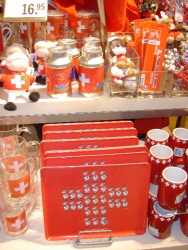
Switzerland is well known for watches, army knives, chocolate, cheese, cow bells, alps, alp horn, trains that run on time* and numbered bank accounts.
*It was an unfortunate coincidence that when my sister and her friend visited Zürich in June 2005 there was a power outage and the train network came to a halt. So after their first few days of being amazed at the punctuality of the trains they found themselves resorting to getting a boat.
Swiss banks are famous worldwide and some may say infamous. The alleged reports that Nazi gold was placed in numbered accounts during World War II caused much controversy and criticism. It is one of those delicate subjects that not many people like to discuss but as with other serious matters, will not go away if we refuse to discuss it. Allegedly, the practice of corrupt foreign officials hiding money in numbered bank accounts still exists in 2006. It is sad to hear that some of these officials are from countries where children suffer from poverty, lack of medical provisions and education. If all the millions stored in these bank accounts were used to provide for the poor what a wonderful world this would be.
Swiss Finishing Schools are well known, particularly amongst the upper classes. The late Diana, Princess of Wales attended the Institute Alpin Videmanette for one term in January 1978 and HRH The Duchess of Cornwall (Camilla) attended the Mon Fertile finishing school.
A couple of myths about Switzerland: -
The cuckoo clock history is linked with the Black Forest in Germany.
The Sound of Music was set in Austria not in Switzerland.
The most famous Swiss book I know of is Heidi by Johana Spyri and still appears to be popular with children in 2006. I received Heidi as a Christmas gift from an Aunt and enjoyed reading about Switzerland.
I am not very knowledgeable about traditional Swiss music but am aware of D.J. Tatana who is famous for dance music and D.J. Bobo, who's single “Chihuahua” was the second best selling single world wide in 2003.
The Swiss film industry is growing in success following the release of such films as “Grounding” and this year sees the release of “Cannabis” in September 2006, which may raise a few eyebrows.
There are many sides to Switzerland and some sides do not match the common perceptions. There is graffiti and litter:-
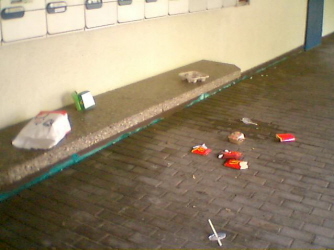
The level of football violence amongst fans and directed at the police is not publicly acknowledged generally or widely reported. I sense racial tension is a growing problem as with most European countries trying to come to terms with an increasing global population on the move. The 2006 May Day riots in Zürich allegedly lasted for many hours and resulted in a Jewish shop being vandalised amongst other property, which has worrying undertones.
I have heard one Xpat telling a potential new Xpat, on the telephone, that Switzerland is crime free which is factually not true and a naïve thought for any Xpat or tourist to believe. One Xpat had her purse stolen on a tram and I am sure many more incidents of violent crime take place.
But one side of Switzerland that goes against the grain of the stereotypical serious professional is when you view the images from the Street Parade which is due to take place in Zürich on Saturday 12 August 2006. There is nothing rigid or insular about most of the participants of this event. Also there is not too much privacy when describing their fashion outfits.
How confusing for an Xpat to be told that charity shops and fund raising events would not fit in as these type of matters ought to be kept private but it is acceptable to wear nearly next to nothing in the streets, allegedly openly take drugs and have shops in family shopping centres that clearly display explicit adult material.
The landscape of Switzerland is literally changing in many ways. An extremely large chunk of the Eiger crashed down to the ground in July 2006 that sent up a cloud of dust covering the nearby Grindelwald for hours. Global warming has been blamed. Geologists believe the problem has been caused as the glacial ice that has held it together has melted. Some areas of Switzerland suffered severe flooding in 2005.
Farmers in Switzerland as with most European countries are facing increasing difficult challenges but one hopes the trend for local organic (bio) products grows and can assist to ease their problems.
Switzerland is very popular with tourists, especially those who love to ski and hike in the mountains. Unfortunately, it is still deemed by some to be elitist and way out of their reach. The British Royal family have and still enjoy travelling to Switzerland for skiing. HRH The Prince of Wales, in 2005, had his “sort of” Stag party in the ski resort of Klosters however it did not bring out the best in him. Did the lack of ideal skiing weather make Charles grumpy or was it down to the hordes of paparazzi following him and his two sons? I say “sort of” Stag party due to the fact that Kate Middleton (HRH Prince William's girlfriend) was in Klosters also. Maybe this was a modern, mixed, pre-wedding party.
Switzerland is blessed with beautiful natural scenery. “Die Schwiez ist das schönste Land der Welt. Es fehlt nur das Meer.” A quote from Stéphane Lambiel(21), a figure skating champion. As with any other country, it is not perfect because it does have a dark side. I do not forget I am the foreigner. The country where I travelled from is not better but different and feel it is a shame, at times, if I make any type of reference to the U.K. it is interpreted as if I am laying down a gauntlet for a competition, which is not the intention. It is because I am yearning to associate myself with something that is familiar and that is a feeling most Xpats get from time to time.
Switzerland has not been ravaged by war in recent times but has been hit by the affects of war e.g. Swiss evacuees from Lebanon recently arrived in Switzerland. The subject of National Service fuels much debate and have heard many people in the U.K. saying they wish they still had National Service, as this may be one method of dealing with the increasing levels of anti social behaviour.
For many years people have laughed at the recycling procedures that are in place in Switzerland but other countries are now waking up to the importance of recycling. Humans do not own planet earth but are caretakers for the next generation. If we continue to use unnecessary packaging and live in a through away society what legacy are we leaving the future generations? Awareness of environmental issues need to start at an earlier age and be nurtured and encouraged by parents/guardians, teachers, religious institutions, retail outlets, restaurants, bars, hotels, social clubs etc..
Switzerland is and could be used even more as a good example in this subject.
Whatever you did on 1 August, I hope you had an enjoyable time, dodged the rain-showers, and embraced the fresher air.
Tschüss
© Theresa Avery. August 2006.
GIVE US YOUR FEEDBACK/THOUGHTS/COMMENTS ON THIS ARTICLE:
Email us your feedback on this article!